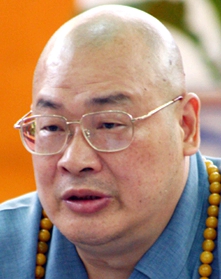 |
|
Shenghui, abbot of Changsha Lushan Temple. |
During his trip to Beijing as a national legislator, the leader of the Changsha Lushan Temple is advocating that all Chinese people, religious or secular, revere nature by taking better care of its wildlife.
"I call for the government to set up a 'Life-Cherishing Day' to enhance the nation's awareness of wildlife protection," Shenghui said.
He submitted a motion to the country's top legislature proposing May 6 as the "Life-Cherishing Day" as it is the last day of the last month of spring in the Chinese lunar calendar.
"On such a day, everyone is encouraged to abstain from eating meat and reflect on their misdeeds in killing animals," he said.
The 65-year-old abbot, who was born Sheng Qinghui, said his proposal, if realized, would contribute to enhancing an "ecological civilization", a signature priority of the central authorities.
Cherishing life, he said, is a long-held tradition. In ancient times, people were told not to eat carp in late spring, as the fish may bear thousands of spawn, nor to shoot a bird in late spring, for it might have fledglings in the nest.
According to Chinese law, any motion submitted by a lawmaker must receive a response, though it may take months, depending on the subject's complexity.
In his proposal, the abbot said wildlife play an irreplaceable part in maintaining an eco-balance and diversity.
"That's their core value, but most of us see beasts, birds and fish, only as sources of food, fun or medicine," he said.
"They see only the value to their personal interests."
Shenghui, who is the only religious deputy among the 117-member Hunan delegation attending the fourth session of the 12th National People's Congress, said there have been misunderstandings and even arrogance among some people when it comes to wildlife.
"Human beings plant crops and harvest, but can they alone make this happen?" Shenghui asked. "In the ecosystem, men have thousands of partners. Some eat insects that would have devoured all the crops. Others help spread pollens. They toil in obscurity."
In addition, the well-being of wildlife is a clear indicator of whether the environment is healthy, he said.
"I've been relieved to see the country's central authorities have begun to mean what they've pledged in environmental protection," he said.
But there are some warped conceptions among some government agencies and average people, he said. He gave examples concerning freeing captive animals.
"Some pious adherents of Buddhism, as well as lay-supporters buy captive birds and fish and set them free, but they sometimes release them in the wrong places, for example, releasing sea fish to a pond," he said. "We call for rational actions when freeing captive animals."